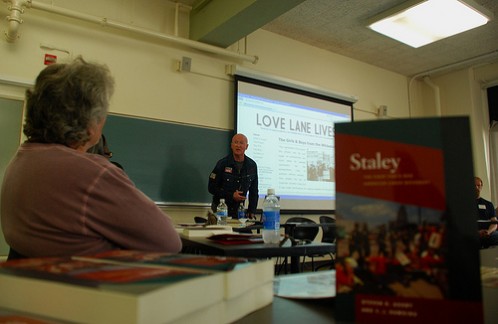Love Lane Lives
The history of sugar in Liverpool and the effects of the closure of the Tate & Lyle sugar refinery, Love Lane
2010, Bloggers Block, Keele WAGs and THE real PRICE OF SUGAR!
Written by Ron Noon at 14:17 on Thursday, February 04th 2010
The last blog was written on Christmas eve but so many things have been happening since which I only felt half equipped to comment on, particularly in relation to the tragic events on the Caribbean island shared by Haiti and the Dominican Republic. A bit of bloggers block on a LOVE LANE LIVES website, (albeit one which has ON THE LANE, BEYOND THE LANE and SUGAR & GLOBALISATION sections), is a small thing, when so much more needs to be done and written about a country which witnessed the world’s first successful slave revolt and the establishment of the first black republic in 1804.
We all have individual and local lives to live in this One World of ours but a “Westerners” experience of the proverbial highs and lows, and peaks and troughs of everyday life, invariably translates in vernacular language into “if we did n’t have the lows then we’d never enjoy the highs”. That seems incredibly trite and indulgent in relation to the sheer scale of human suffering we’ve witnessed in Haiti. Why must those who have least have even less? I think it was about nine days into the disaster when I saw on the TV screen planes flying foodstuffs and supplies into an airport named after Toussaint L’Ouverture, and I immediately thought what “if” we could use some ghostly interviewing techniques to ask the famous BLACK JACOBIN what he thought about his descendants plight, what would he say?
What would he say about the illegal Haitian migrants and their children in the sugar bateyes of the adjacent Dominican Republic who are stateless and denied basic human rights and education? What would he say about the Sugar barons and the vested interests that have allowed this trafficking in people to go on? What would he say about the “cease and desist” order that was issued by a prestigious Washington law firm on behalf of one of those sugar baron families to limit the distribution of Bill Haney’s remarkable film THE PRICE OF SUGAR? The list of questions seems endless because someone far better equipped than most to write about Haiti, Gary Young of the Guardian pointed out earlier on this week that “Haiti is not a failed state; it’s a state that has been failed since it’s birth”. For workers to “tramp” to the DR to work on the bateyes has only emphasised just how systemic and abject the problems of this failed state have been for generations. How many more Haitians will be seeking to gain entry into the DR now?
Gary Young referred to a conference in Montreal last week of government and international agency representatives called FRIENDS OF HAITI who convened to discuss the country’s long and short term needs. Chillingly he notes that “even as the corpses remained under the earthquake’s rubble and the government operated out of a police station, the assembled ‘friends’ would not commit to cancelling Haiti’s $1b debt. Instead they agreed to a 10 year plan with no details, and a commitment to meet again - when the bodies have been buried along with the coverage of the country - sometime in the future”!
Anyway bloggers block defeated I’m off to Keele University in rural Staffordshire later on this afternoon to give a talk to OWEN POWELL’S prestigious WORLD AFFAIRS GROUP about High Fructose Corn Syrup (HFCS) and the politics of corn! It might start something like this:
“What’s that I smell in the air? The American Dream. Sweet as a new millionaire, The American Dream.”
That extract from Miss Saigon perhaps overstates the career profiles of middle America in the 1990s, certainly in Decatur Illinois! Tate & Lyle the sugar giant made on Merseyside, had acquired in a controversial leveraged takeover in 1988, the Decatur based A.E.Staley Mfg Co. Staleys, a once proudly paternalistic firm produced HFCS from CORN. (Many of the Tates workers I interview have claimed Tate & Lyle before the demise of the families were equally proud of their paternalistic reputation.)
The American dream was a fantasy that had become a reality for millions of blue collar Americans post-World War II and in Decatur before Tates. This mini-Chicago, (175 miles south of its bigger metropolitan neighbour), had about one third of its working population in manufacturing. That was before the era of “Transnationalisation”. For those blue collar Americans the smell in the air was the smell of money, a daily reminder that the good life was literally the sweet life. The bakery smells from the Staley plant would waft over the Viaduct on 22nd street.
Labor expert Kim Moody points out that “well into the mid-1980s” everything in town “seemed local and as American as apple pie” and that “even the multi-nationals like Caterpillar or Firestone Tire were names known across the Midwest farm belt for generations”. Globalisation and the era of downsizing and re-engineering would change all that and by the end of the 1980s, the London Sugar Giant in a controversial buy-out of “Gene” Staley’s traditional, paternalistic company, completed the triad of MNCs that would turn the world of Decatur workers upside down. The Staley, Caterpillar and Bridgestone/Firestone labor struggles in Decatur, Illinois in the middle of the 1990s created a turning point for labor. (Why can’t American cousins spell?)
Right no time for more bloggin. I’ve got to get down that M6, arguably the biggest car park in Europe to the leafy side lanes of Keele and Owen’s WAGs, not Sven’s.
............................................................................................................................................................................................................................................
This photograph is of a session I chaired at the Labor History conference in Chicago last May. The wonderful guy “listening” to my introduction is Dan Lane and he is one of the great “road warriors” of the Decatur struggles.
